| Srl | Item |
| 1 |
ID:
057178


|
|
|
| 2 |
ID:
129147
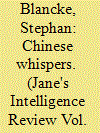

|
|
|
| 3 |
ID:
129120
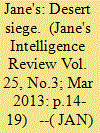

|
|
|
| 4 |
ID:
181602
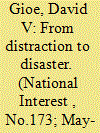

|
|
|
|
|
| Summary/Abstract |
America’s strategic distraction has favored addressing foreign threats and those domestically with a foreign aspect, leaving a wide space for domestic extremism to go unchecked.
|
|
|
|
|
|
|
|
|
|
|
|
|
|
|
|
| 5 |
ID:
069302


|
|
|
| 6 |
ID:
056796


|
|
|
| 7 |
ID:
171567


|
|
|
| 8 |
ID:
124525
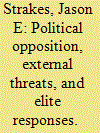

|
|
|
|
|
| Publication |
2013.
|
| Summary/Abstract |
In the years since the 2003 Rose Revolution, the popularly elected leadership of the Republic of Georgia has responded to organized protests with a variety of repressive tactics. These reactions suggest that former challengers to authoritarian elites may utilize similar methods of retaining power during crisis periods. Yet, the alleged involvement of agencies of the Russian Federation in fomenting domestic instability has also occupied a central position in the national security policies of the outgoing Saakashvili government. These conditions both preceded and were reinforced by the South Ossetia War of August 2008. This article proposes a theoretical model that represents the intervening effect of interstate conflicts on state-society relations in Georgia from 2003 to present. It presents several hypotheses and possible indicators, data sources, and techniques for analyzing the interaction between characteristics of opposition groups, external threats, and the domestic security practices of contemporary Georgian political elites.
|
|
|
|
|
|
|
|
|
|
|
|
|
|
|
|
| 9 |
ID:
156607
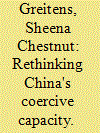

|
|
|
|
|
| Summary/Abstract |
Discussions of China's rising domestic security expenditure often present this spending as evidence of the Chinese Communist Party's strong coercive capacity. This article argues that a lack of theoretical clarity about domestic security has resulted in flawed conclusions about these expenditures and their implications for China's coercive capacity. Challenging the conventional wisdom, the article analyses China's domestic security spending from 1992 through 2012 and argues that it is important to consider not only the total amount that China spends but also how it spends these resources and the magnitude of the threats that this expenditure must address. It finds that China's domestic security spending is not historically unprecedented, is not expanding as a proportion of national expenditure, and is not necessarily high (or producing high coercive capacity) when compared to other countries. The article also shows that certain locations struggle more to fund their coercive capacity than others, and that these locations overlap with areas where internal security threats may be particularly acute. The challenges that the coercive apparatus must address have also grown over the same period during which domestic security spending has risen. Finally, attempts to improve the political position of China's coercive agents cannot be equated with improvements in their capacity to manage Chinese society. Cumulatively, this reassessment provides more evidence of the limitations on China's coercive capacity than of its strength.
|
|
|
|
|
|
|
|
|
|
|
|
|
|
|
|
| 10 |
ID:
181161
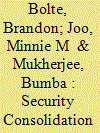

|
|
|
|
|
| Summary/Abstract |
Policymakers and peacebuilding research often focus on rebel groups when studying demobilization and integration processes, but post-war governments must also manage the non-state militias that helped them gain or maintain power. Why do some post-war governments disintegrate their militia allies, while others integrate them into the military? We argue that when a salient ethnic difference exists between the (new) ruling elite and an allied militia, a process of mutual uncertainty in the post-war period will incentivize governments to disintegrate the group. However, governments will be most likely to integrate their militias when the military has sufficient coercive capabilities but few organizational hindrances to re-organizing. Using new data on the post-war fates of victorious militias across all civil conflicts from 1989 to 2014, we find robust support for these claims. The results suggest that a government’s optimal militia management strategy is shaped by both social and organizational constraints during the post-war period.
|
|
|
|
|
|
|
|
|
|
|
|
|
|
|
|
| 11 |
ID:
084281


|
|
|